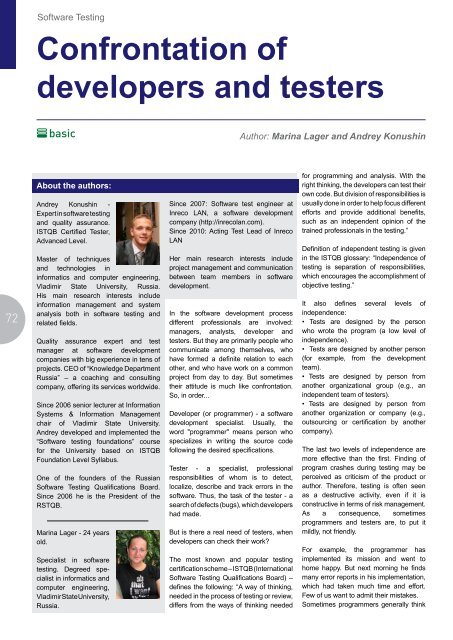Comparison of Change Management Systems
Comparison of Change Management Systems
Comparison of Change Management Systems
You also want an ePaper? Increase the reach of your titles
YUMPU automatically turns print PDFs into web optimized ePapers that Google loves.
72<br />
S<strong>of</strong>tware Testing<br />
Confrontation <strong>of</strong><br />
developers and testers<br />
basic<br />
intermediate<br />
advanced<br />
About the authors:<br />
Andrey Konushin -<br />
Expert in s<strong>of</strong>tware testing<br />
and quality assurance.<br />
ISTQB Certified Tester,<br />
Advanced Level.<br />
Master <strong>of</strong> techniques<br />
and technologies in<br />
informatics and computer engineering,<br />
Vladimir State University, Russia.<br />
His main research interests include<br />
information management and system<br />
analysis both in s<strong>of</strong>tware testing and<br />
related fields.<br />
Quality assurance expert and test<br />
manager at s<strong>of</strong>tware development<br />
companies with big experience in tens <strong>of</strong><br />
projects. CEO <strong>of</strong> “Knowledge Department<br />
Russia” – a coaching and consulting<br />
company, <strong>of</strong>fering its services worldwide.<br />
Since 2006 senior lecturer at Information<br />
<strong>Systems</strong> & Information <strong>Management</strong><br />
chair <strong>of</strong> Vladimir State University.<br />
Andrey developed and implemented the<br />
“S<strong>of</strong>tware testing foundations” course<br />
for the University based on ISTQB<br />
Foundation Level Syllabus.<br />
One <strong>of</strong> the founders <strong>of</strong> the Russian<br />
S<strong>of</strong>tware Testing Qualifications Board.<br />
Since 2006 he is the President <strong>of</strong> the<br />
RSTQB.<br />
Marina Lager - 24 years<br />
old.<br />
Specialist in s<strong>of</strong>tware<br />
testing. Degreed specialist<br />
in informatics and<br />
computer engineering,<br />
Vladimir State University,<br />
Russia.<br />
Since 2007: S<strong>of</strong>tware test engineer at<br />
Inreco LAN, a s<strong>of</strong>tware development<br />
company (http://inrecolan.com).<br />
Since 2010: Acting Test Lead <strong>of</strong> Inreco<br />
LAN<br />
Her main research interests include<br />
project management and communication<br />
between team members in s<strong>of</strong>tware<br />
development.<br />
In the s<strong>of</strong>tware development process<br />
different pr<strong>of</strong>essionals are involved:<br />
managers, analysts, developer and<br />
testers. But they are primarily people who<br />
communicate among themselves, who<br />
have formed a definite relation to each<br />
other, and who have work on a common<br />
project from day to day. But sometimes<br />
their attitude is much like confrontation.<br />
So, in order...<br />
Developer (or programmer) - a s<strong>of</strong>tware<br />
development specialist. Usually, the<br />
word "programmer" means person who<br />
specializes in writing the source code<br />
following the desired specifications.<br />
Tester - a specialist, pr<strong>of</strong>essional<br />
responsibilities <strong>of</strong> whom is to detect,<br />
localize, describe and track errors in the<br />
s<strong>of</strong>tware. Thus, the task <strong>of</strong> the tester - a<br />
search <strong>of</strong> defects (bugs), which developers<br />
had made.<br />
But is there a real need <strong>of</strong> testers, when<br />
developers can check their work?<br />
The most known and popular testing<br />
certification scheme – ISTQB (International<br />
S<strong>of</strong>tware Testing Qualifications Board) –<br />
defines the following: “A way <strong>of</strong> thinking,<br />
needed in the process <strong>of</strong> testing or review,<br />
differs from the ways <strong>of</strong> thinking needed<br />
Author: Marina Lager and Andrey Konushin<br />
for programming and analysis. With the<br />
right thinking, the developers can test their<br />
own code. But division <strong>of</strong> responsibilities is<br />
usually done in order to help focus different<br />
efforts and provide additional benefits,<br />
such as an independent opinion <strong>of</strong> the<br />
trained pr<strong>of</strong>essionals in the testing.”<br />
Definition <strong>of</strong> independent testing is given<br />
in the ISTQB glossary: “Independence <strong>of</strong><br />
testing is separation <strong>of</strong> responsibilities,<br />
which encourages the accomplishment <strong>of</strong><br />
objective testing.”<br />
It also defines several levels <strong>of</strong><br />
independence:<br />
• Tests are designed by the person<br />
who wrote the program (a low level <strong>of</strong><br />
independence).<br />
• Tests are designed by another person<br />
(for example, from the development<br />
team).<br />
• Tests are designed by person from<br />
another organizational group (e.g., an<br />
independent team <strong>of</strong> testers).<br />
• Tests are designed by person from<br />
another organization or company (e.g.,<br />
outsourcing or certification by another<br />
company).<br />
The last two levels <strong>of</strong> independence are<br />
more effective than the first. Finding <strong>of</strong><br />
program crashes during testing may be<br />
perceived as criticism <strong>of</strong> the product or<br />
author. Therefore, testing is <strong>of</strong>ten seen<br />
as a destructive activity, even if it is<br />
constructive in terms <strong>of</strong> risk management.<br />
As a consequence, sometimes<br />
programmers and testers are, to put it<br />
mildly, not friendly.<br />
For example, the programmer has<br />
implemented its mission and went to<br />
home happy. But next morning he finds<br />
many error reports in his implementation,<br />
which had taken much time and effort.<br />
Few <strong>of</strong> us want to admit their mistakes.<br />
Sometimes programmers generally think



